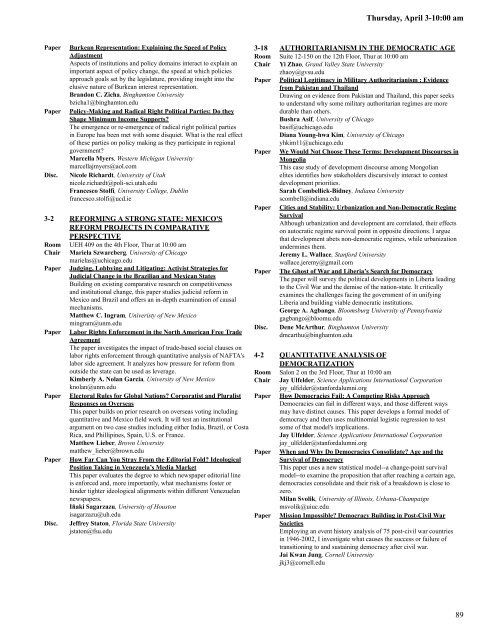2008 Conference Program - Midwest Political Science Association
2008 Conference Program - Midwest Political Science Association
2008 Conference Program - Midwest Political Science Association
Create successful ePaper yourself
Turn your PDF publications into a flip-book with our unique Google optimized e-Paper software.
Thursday, April 3-10:00 am<br />
Paper<br />
Paper<br />
Disc.<br />
Burkean Representation: Explaining the Speed of Policy<br />
Adjustment<br />
Aspects of institutions and policy domains interact to explain an<br />
important aspect of policy change, the speed at which policies<br />
approach goals set by the legislature, providing insight into the<br />
elusive nature of Burkean interest representation.<br />
Brandon C. Zicha, Binghamton University<br />
bzicha1@binghamton.edu<br />
Policy-Making and Radical Right <strong>Political</strong> Parties: Do they<br />
Shape Minimum Income Supports<br />
The emergence or re-emergence of radical right political parties<br />
in Europe has been met with some disquiet. What is the real effect<br />
of these parties on policy making as they participate in regional<br />
government<br />
Marcella Myers, Western Michigan University<br />
marcellajmyers@aol.com<br />
Nicole Richardt, University of Utah<br />
nicole.richardt@poli-sci.utah.edu<br />
Francesco Stolfi, University College, Dublin<br />
francesco.stolfi@ucd.ie<br />
3-2 REFORMING A STRONG STATE: MEXICO'S<br />
REFORM PROJECTS IN COMPARATIVE<br />
PERSPECTIVE<br />
Room UEH 409 on the 4th Floor, Thur at 10:00 am<br />
Chair Mariela Szwarcberg, University of Chicago<br />
marielas@uchicago.edu<br />
Paper Judging, Lobbying and Litigating: Activist Strategies for<br />
Judicial Change in the Brazilian and Mexican States<br />
Building on existing comparative research on competitiveness<br />
and institutional change, this paper studies judicial reform in<br />
Mexico and Brazil and offers an in-depth examination of causal<br />
mechanisms.<br />
Matthew C. Ingram, Univeristy of New Mexico<br />
mingram@unm.edu<br />
Paper Labor Rights Enforcement in the North American Free Trade<br />
Agreement<br />
The paper investigates the impact of trade-based social clauses on<br />
labor rights enforcement through quantitative analysis of NAFTA's<br />
labor side agreement. It analyzes how pressure for reform from<br />
outside the state can be used as leverage.<br />
Kimberly A. Nolan Garcia, University of New Mexico<br />
knolan@unm.edu<br />
Paper Electoral Rules for Global Nations Corporatist and Pluralist<br />
Responses on Overseas<br />
This paper builds on prior research on overseas voting including<br />
quantitative and Mexico field work. It will test an institutional<br />
argument on two case studies including either India, Brazil, or Costa<br />
Rica, and Phillipines, Spain, U.S. or France.<br />
Matthew Lieber, Brown University<br />
matthew_lieber@brown.edu<br />
Paper How Far Can You Stray From the Editorial Fold Ideological<br />
Position Taking in Venezuela’s Media Market<br />
This paper evaluates the degree to which newspaper editorial line<br />
is enforced and, more importantly, what mechanisms foster or<br />
hinder tighter ideological alignments within different Venezuelan<br />
newspapers.<br />
Iñaki Sagarzazu, University of Houston<br />
isagarzazu@uh.edu<br />
Disc. Jeffrey Staton, Florida State University<br />
jstaton@fsu.edu<br />
3-18 AUTHORITARIANISM IN THE DEMOCRATIC AGE<br />
Room Suite 12-150 on the 12th Floor, Thur at 10:00 am<br />
Chair Yi Zhao, Grand Valley State University<br />
zhaoy@gvsu.edu<br />
Paper <strong>Political</strong> Legitimacy in Military Authoritarianism : Evidence<br />
from Pakistan and Thailand<br />
Drawing on evidence from Pakistan and Thailand, this paper seeks<br />
to understand why some military authoritarian regimes are more<br />
durable than others.<br />
Bushra Asif, University of Chicago<br />
basif@uchicago.edu<br />
Diana Young-hwa Kim, University of Chicago<br />
yhkim11@uchicago.edu<br />
Paper We Would Not Choose These Terms: Development Discourses in<br />
Mongolia<br />
This case study of development discourse among Mongolian<br />
elites identifies how stakeholders discursively interact to contest<br />
development priorities.<br />
Sarah Combellick-Bidney, Indiana University<br />
scombell@indiana.edu<br />
Paper Cities and Stability: Urbanization and Non-Democratic Regime<br />
Survival<br />
Although urbanization and development are correlated, their effects<br />
on autocratic regime survival point in opposite directions. I argue<br />
that development abets non-democratic regimes, while urbanization<br />
undermines them.<br />
Jeremy L. Wallace, Stanford University<br />
wallace.jeremy@gmail.com<br />
Paper The Ghost of War and Liberia’s Search for Democracy<br />
The paper will survey the political developments in Liberia leading<br />
to the Civil War and the demise of the nation-state. It critically<br />
examines the challenges facing the government of in unifying<br />
Liberia and building viable democratic institutions.<br />
George A. Agbango, Bloomsburg University of Pennsylvania<br />
gagbango@bloomu.edu<br />
Disc. Dene McArthur, Binghamton University<br />
dmcarthu@binghamton.edu<br />
4-2 QUANTITATIVE ANALYSIS OF<br />
DEMOCRATIZATION<br />
Room Salon 2 on the 3rd Floor, Thur at 10:00 am<br />
Chair Jay Ulfelder, <strong>Science</strong> Applications International Corporation<br />
jay_ulfelder@stanfordalumni.org<br />
Paper How Democracies Fail: A Competing Risks Approach<br />
Democracies can fail in different ways, and those different ways<br />
may have distinct causes. This paper develops a formal model of<br />
democracy and then uses multinomial logistic regression to test<br />
some of that model's implications.<br />
Jay Ulfelder, <strong>Science</strong> Applications International Corporation<br />
jay_ulfelder@stanfordalumni.org<br />
Paper When and Why Do Democracies Consolidate Age and the<br />
Survival of Democracy<br />
This paper uses a new statistical model--a change-point survival<br />
model--to examine the proposition that after reaching a certain age,<br />
democracies consolidate and their risk of a breakdown is close to<br />
zero.<br />
Milan Svolik, University of Illinois, Urbana-Champaign<br />
msvolik@uiuc.edu<br />
Paper Mission Impossible Democracy Building in Post-Civil War<br />
Societies<br />
Employing an event history analysis of 75 post-civil war countries<br />
in 1946-2002, I investigate what causes the success or failure of<br />
transitioning to and sustaining democracy after civil war.<br />
Jai Kwan Jung, Cornell University<br />
jkj3@cornell.edu<br />
89










